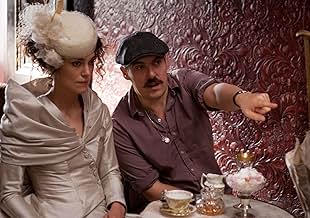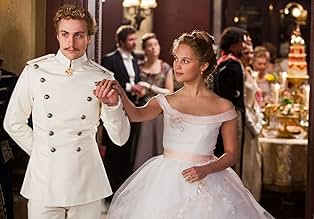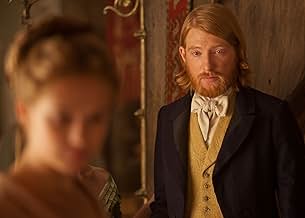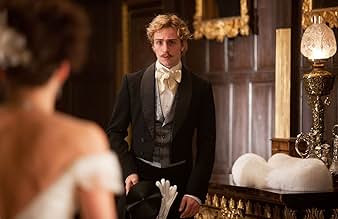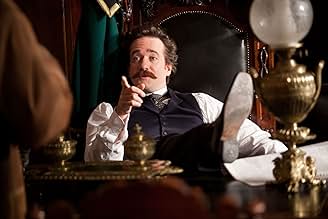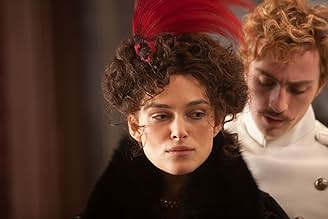Vers la fin du dix-neuvième siècle dans la haute société russe à St. Petersbourg, aristocrate Anna Kareina entre en relation qui lui changera la vie avec l'attirant Conte Alexei Vronsky.Vers la fin du dix-neuvième siècle dans la haute société russe à St. Petersbourg, aristocrate Anna Kareina entre en relation qui lui changera la vie avec l'attirant Conte Alexei Vronsky.Vers la fin du dix-neuvième siècle dans la haute société russe à St. Petersbourg, aristocrate Anna Kareina entre en relation qui lui changera la vie avec l'attirant Conte Alexei Vronsky.
- A remporté 1 oscar
- 33 victoires et 54 nominations au total
Avis en vedette
Remember that scene early in Inception where Leonardo di Caprio and Ellen Page are sitting at a sidewalk cafe as he explains how his dream technology works? He points out that in a dream you never question the time, place, or circumstances in which you find yourself, you just accept them as normal. Suddenly windows start exploding, pavement buckles, the streets of Paris start curving over their heads, and you realize that the entire sequence has played out just the way he described it. You, sitting in the audience, never questioned how they got to that cafe in the 1st place, you just took it for granted.
The reason Christopher Nolan was able to pull this off so deftly was that we bring the same short-cut sensibility with us to the movies. We see a person in an office, a taxi, a restaurant, and an apartment in quick succession but don't want to be bored with the tedium of actually getting from one of those locales to the next, so we gladly accept the cinematic convention of just jump-cutting from scene to scene.
The most recent (of many) productions of Anna Karenina, Leo Tolstoy's classic novel of a high-society scandal in doomed imperial Russia circa 1890, reveals some of this artifice to the inquisitive eye. Much of the film appears to be set on an actual theater stage, but characters walk on and off that stage to what appears to be the real world — or saunter backstage to have it turn into a train station. Much of it is stilted and artificial — such as all the other dancers freezing in position during the Platonic ideal of a ballroom waltz (with heavy swing-dance styling), as Anna and Vronsky swirl among them. The extent of privilege of the Russian noble classes is underlined by the way in which the various counts and dukes just casually hold out a hand, expecting out of habit that a drink or the next piece of paperwork will be instantly placed there by an obsequious lackey, or holding out an arm while doing a 360, never questioning that the office suit coat will be removed by the left-hand lackey while the evening jacket is being simultaneously slipped on by the right-hand one. And director Joe Wright cuts the audience no expositional slack whatsoever in introducing the characters or keeping their various nicknames straight (and Russians have lots of nicknames); you just have to pick up who's who on your own.
The costuming is sumptuous and seems a lock for this year's Oscar in that category. However, I was bemused that, shortly after leaving the Sundance Theater, I swung by the Middleton Marriott to drop off some fliers at TeslaCon, a steampunk immersion convention, and found myself walking into the kind of artificial environment Wright had created, with congoers all self-costumed nearly as well as the best Hollywood could produce.
All of this style and metapresentation comes at a price, however, and the price is the humanity of the characters. Due to the mode of presentation, we can never suspend our disbelief long enuf to start thinking of them as real people; they remain actors in a play, and we're never allowed to forget it.
Keira Knightley is radiant as Anna, and Jude Law is agonizingly prim, principled, and earnest as Karenin (and we can't help but feel serious empathy for him, despite learning that his parliamentary maneuverings represent the worst form of bigotry), but I was disappointed in Aaron Taylor-Johnson as Vronsky. He seemed too effete and foppish and not nearly dashing enuf to win Anna's heart at first glance. But then, as he remarked, "you can't ask why about love."
This version of AK will certainly be remembered more for its staging than for its story. Perhaps that's excusable, since the story has been told so many times before, and often well and beautifully, but it's a shame that we were reduced to thinking of it as a necessary nuisance getting in the way of the stagecraft.
The reason Christopher Nolan was able to pull this off so deftly was that we bring the same short-cut sensibility with us to the movies. We see a person in an office, a taxi, a restaurant, and an apartment in quick succession but don't want to be bored with the tedium of actually getting from one of those locales to the next, so we gladly accept the cinematic convention of just jump-cutting from scene to scene.
The most recent (of many) productions of Anna Karenina, Leo Tolstoy's classic novel of a high-society scandal in doomed imperial Russia circa 1890, reveals some of this artifice to the inquisitive eye. Much of the film appears to be set on an actual theater stage, but characters walk on and off that stage to what appears to be the real world — or saunter backstage to have it turn into a train station. Much of it is stilted and artificial — such as all the other dancers freezing in position during the Platonic ideal of a ballroom waltz (with heavy swing-dance styling), as Anna and Vronsky swirl among them. The extent of privilege of the Russian noble classes is underlined by the way in which the various counts and dukes just casually hold out a hand, expecting out of habit that a drink or the next piece of paperwork will be instantly placed there by an obsequious lackey, or holding out an arm while doing a 360, never questioning that the office suit coat will be removed by the left-hand lackey while the evening jacket is being simultaneously slipped on by the right-hand one. And director Joe Wright cuts the audience no expositional slack whatsoever in introducing the characters or keeping their various nicknames straight (and Russians have lots of nicknames); you just have to pick up who's who on your own.
The costuming is sumptuous and seems a lock for this year's Oscar in that category. However, I was bemused that, shortly after leaving the Sundance Theater, I swung by the Middleton Marriott to drop off some fliers at TeslaCon, a steampunk immersion convention, and found myself walking into the kind of artificial environment Wright had created, with congoers all self-costumed nearly as well as the best Hollywood could produce.
All of this style and metapresentation comes at a price, however, and the price is the humanity of the characters. Due to the mode of presentation, we can never suspend our disbelief long enuf to start thinking of them as real people; they remain actors in a play, and we're never allowed to forget it.
Keira Knightley is radiant as Anna, and Jude Law is agonizingly prim, principled, and earnest as Karenin (and we can't help but feel serious empathy for him, despite learning that his parliamentary maneuverings represent the worst form of bigotry), but I was disappointed in Aaron Taylor-Johnson as Vronsky. He seemed too effete and foppish and not nearly dashing enuf to win Anna's heart at first glance. But then, as he remarked, "you can't ask why about love."
This version of AK will certainly be remembered more for its staging than for its story. Perhaps that's excusable, since the story has been told so many times before, and often well and beautifully, but it's a shame that we were reduced to thinking of it as a necessary nuisance getting in the way of the stagecraft.
It took me about an hour to stop being irritated by the movie's self consciousness, to sort of enjoy it... but the damage was done.
As viewers, we have no reason to believe in the love Anna finds. He is creepy and give us no inkling of why she might ruin her life for him.
Kiera isn't bad, just annoying, considering we have no empathy for her self indulgence. If her husband was worse, her love a lot nicer, and if we could feel electricity between them, it would be a different matter, but the fact is the movie is too busy being clever... it misses out on having a heart and soul.
The theatre gimmick got in the way, and seemed like a cheap way of having Moscow backdrops without actually traveling there.
5/10
As viewers, we have no reason to believe in the love Anna finds. He is creepy and give us no inkling of why she might ruin her life for him.
Kiera isn't bad, just annoying, considering we have no empathy for her self indulgence. If her husband was worse, her love a lot nicer, and if we could feel electricity between them, it would be a different matter, but the fact is the movie is too busy being clever... it misses out on having a heart and soul.
The theatre gimmick got in the way, and seemed like a cheap way of having Moscow backdrops without actually traveling there.
5/10
I loved the cinematography of the Theatre. I loved that everything got out from the stage. The director did a pretty good job directing this.
The staging of this film is certainly something I hadn't seen before. The majority of scenes are made to look like everything is happening on a theater stage. This style doesn't add a whole lot to the film though. While the costumes, production design, music, and cinematography are all terrific, I'm afraid I can't say the same about the story. It just didn't really capture me and I found a lot of the film to be boring. Anna Karenina may be a classic text, but I can't use the same adjective for this retelling.
This adaptation of Anna Karenina is a very flat adaptation of one of the greatest pieces of literature, but actually it is not only a failure as an adaptation but disappointing also on its own merits. It is not without its redeeming qualities of course, the costumes and sets are gorgeous and some of the best of the year, the music is beautifully composed, Jude Law is a superbly restrained and dignified Karenin and Matthew Macfadyen and Domhnall Gleeson are similarly excellent as Stiva and Levin respectively. Keira Knightley in the title role however didn't do it for me. She tries but comes across as too young and too selfish, and I also didn't care at all for her over-earnest mannerisms. The weak link of the cast is the woeful miscast that is Aaron Taylor-Johnson's Vronsky, often too moody and wooden as well as too effeminate and foppish, so much so it comes across as creepy. The script is very stilted and lacking in any kind of heart. There is a lot of melodrama as well but it comes across as forced, while the switching from play-within-a-play to film is confusing. The story similarly suffers from pedestrian pacing and the drama and characters are too thin to make us properly care and that is including Anna, whose attempts to overcome her suffering is entirely too trivialised here. Even bigger of a problem was Joe Wright's direction, I loved Pride and Prejudice and especially Atonement so I hoping a similar kind of directing job. But Wright often seems to be paying attention to himself too much, with the camera work too incongruous and surreal. Everything, from the gimmicky theatrical elements to the ball scene where the dancing is so robotic and where you don't have a clue what dance style it's supposed to be, plays too much of an overblown musical but without song and dance. In conclusion a disappointment even on its own, for me a beautiful bore is a very apt summing up as to how I felt about it. See the Greta Garbo and Vivien Leigh films instead. 4/10 Bethany Cox
Le saviez-vous
- AnecdotesOne of Alicia Vikander's favorite experiences from the production was the filming that took place in the countryside outside of St. Petersburg, Russia. The temperatures dropped below -40 °C, and she stayed in a cabin for five days that didn't have hot water and only featured benches instead of beds. Meanwhile, Russian security guards protected her and co-star 'Domhnall Gleeson' from wild wolves and bears that dominated the deserted area.
- GaffesThe label of the bottle of morphine Anna drinks from changes from "la Morphine" to "Morphine" between shots. The only correct French form would be without an article (prescriptions would have been written in Latin in 19th-century Russia anyway).
- ConnexionsFeatured in Projector: Anna Karenina (2012)
- Bandes originalesSong for a New Life (Masha's Song)
(uncredited)
Written by Anoushka Shankar
Performed by Tannishtha Chatterjee
Meilleurs choix
Connectez-vous pour évaluer et surveiller les recommandations personnalisées
- How long is Anna Karenina?Propulsé par Alexa
Détails
- Date de sortie
- Pays d’origine
- Site officiel
- Langue
- Aussi connu sous le nom de
- Anna Karenina
- Lieux de tournage
- Kizhi, Karelia, Russie(on location)
- sociétés de production
- Consultez plus de crédits d'entreprise sur IMDbPro
Box-office
- Budget
- 40 600 000 $ US (estimation)
- Brut – États-Unis et Canada
- 12 816 367 $ US
- Fin de semaine d'ouverture – États-Unis et Canada
- 320 690 $ US
- 18 nov. 2012
- Brut – à l'échelle mondiale
- 68 929 150 $ US
- Durée
- 2h 9m(129 min)
- Couleur
- Mixage
- Rapport de forme
- 2.35 : 1
Contribuer à cette page
Suggérer une modification ou ajouter du contenu manquant







